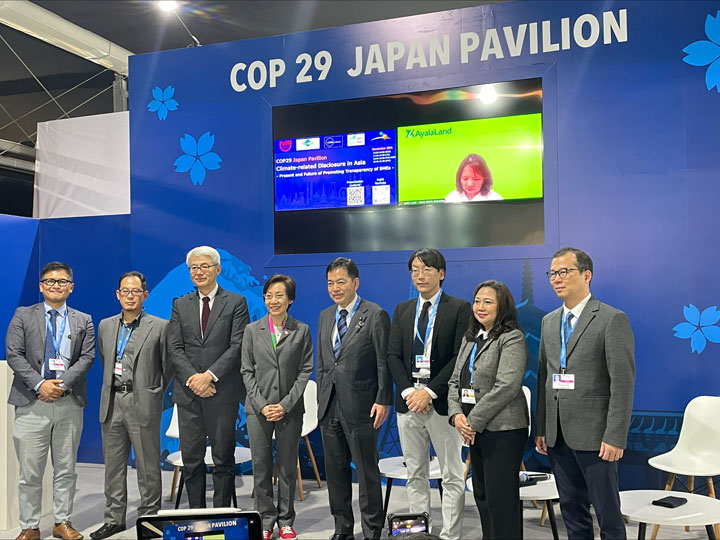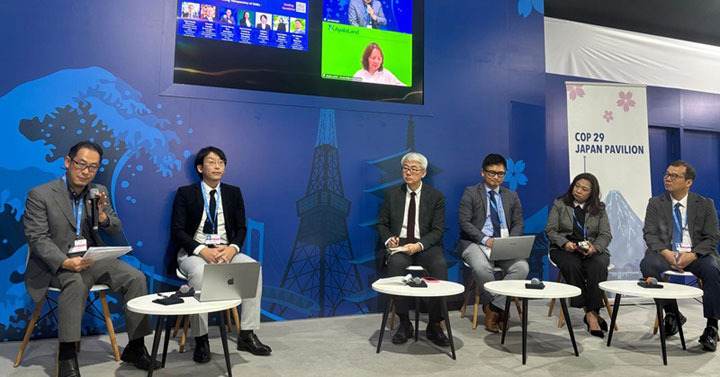【COP29 Side-Event】Climate-related Disclosure in Asia - Promoting Transparency in SMEs Now and in the Future
Day:2024.12.19
event |
| identity | belong to | title |
|---|---|---|
| Koji Fukuda | Japan International Cooperation Agency (JICA) SPI-NDC Project | Long-term expert (Chief Advisor) |
Date: November 20, 2024
Host: Ministry of the Environment of Japan
Co-host: Asian Development Bank (ADB), Japan International Cooperation Agency (JICA) SPI-NDC, Overseas Environmental Cooperation Center (OECC)
Name of venue (pavilion name):Japan Pavilion
| identity | belong to | title |
|---|---|---|
| Keiichiro Asao | Ministry of the Environment of Japan | Minister |
| Grace Fu Hai Yien | Ministry of Sustainability and Environment of Singapore | Minister |
| Tetsushi Sonobe | Asian Development Bank Institute (ADBI) | Dean and CEO |
| Makoto Kato | Overseas Environmental Cooperation Center(OECC) | Board member/Principal researcher |
| Koji Fukuda | Japan International Cooperation Agency (JICA) SPI-NDC Project | Long-term expert (Chief Advisor) |
| Luong Anh Huy. | Mitigation Division, Climate Change Department, Ministry of Natural Resources and Environment, Vietnam | Director |
| Rachel Esther Gumtang Remalante | Securities and Exchange Commission of the Philippines | Director |
| Anna Maria Gonzalez | Ayala Land Inc. | Head of Corporate Sustainability |
| Takehiro Watase | Asuene Corporation | Executive Officer CPO |
This event was held to have discussion with governments, donors, and the private sector about incentives for contribution and engagement by SMEs as GHG emissions accounting reporting and climate-related information disclosure progresses in ASEAN.
Mr. Asao, Minister of the Environment of Japan, and Ms. Fu, Minister of the Sustainability and Environment of Singapore, made opening remarks, noting that Singapore is making progress on this theme, with IFRS-compliant information disclosure starting in fiscal year 2025 and SME calculations are underway. Also, digital tools under the domestic sustainability reporting program in Singapore are being developed.
In the panel discussion, Mr. Fukuda of JICA SPI-NDC Project, moderated the discussion and shared his experiences and views on three main issues.
Discussion Point 1: What are the challenges for SMEs in promoting climate change-related information disclosure in ASEAN?
Discussion Point 2: What are the concrete actions that can be taken to resolve the issues?
Discussion Point 3: Where should corporate climate change-related disclosure go?
With regard to the issue 1, the SEC of the Philippines pointed out that the domestic system, forms, and online platform for corporate GHG disclosure have been developed since 2019, and the disclosure by listed companies has been progressing, but SMEs are still in the process of developing their disclosure. Similarly, Vietnam MONRE pointed out that GHG capture by large enterprises is leading the way with mandatory corporate GHG accounting and reporting, and that it needs to be gradually rolled out to SMEs, but that in many cases there is relatively insufficient awareness of GHG reductions and it is difficult to meet GHG disclosure requirements without outsourcing. Asuene pointed out that there are issues related to internal human resource constraints, calculation costs, and data maintenance, and Ayala also pointed out human resource constraints.
Regarding the measures to solve Discussion Point 2, OECC mentioned investors' requests, while ADBI emphasized the automation of data collection required for calculation, ensuring a forum for knowledge sharing among stakeholders, and support by development finance institutions. In particular, DFIs could support companies in developing transition plans, and there is room for financial institutions to support portfolio decarbonization and SME scope 1 and 2 calculations. Asuene pointed out the simplification of reporting templates, digitalization, and harmonization and unification of standards.
Regarding the direction of Discussion Point 3, ADBI mentioned the usefulness of inter-regional mutual learning as well as mutual growth while fostering healthy peer pressure in ASEAN. SEC suggested that, in the context of ASEAN, it is important to develop "own standards" in a way that is appropriate for regional objectives.

group photo

Panel Discussion
scroll